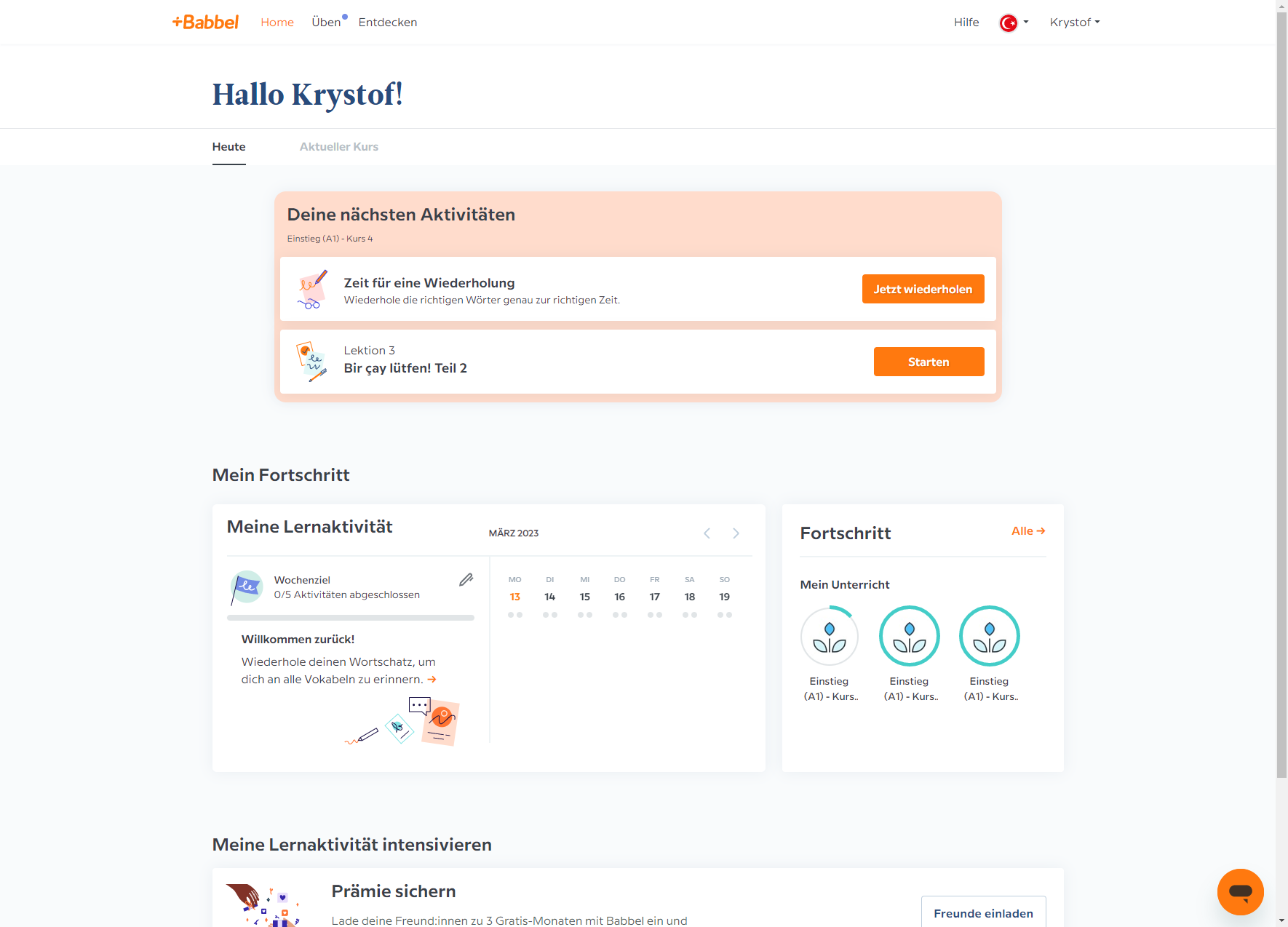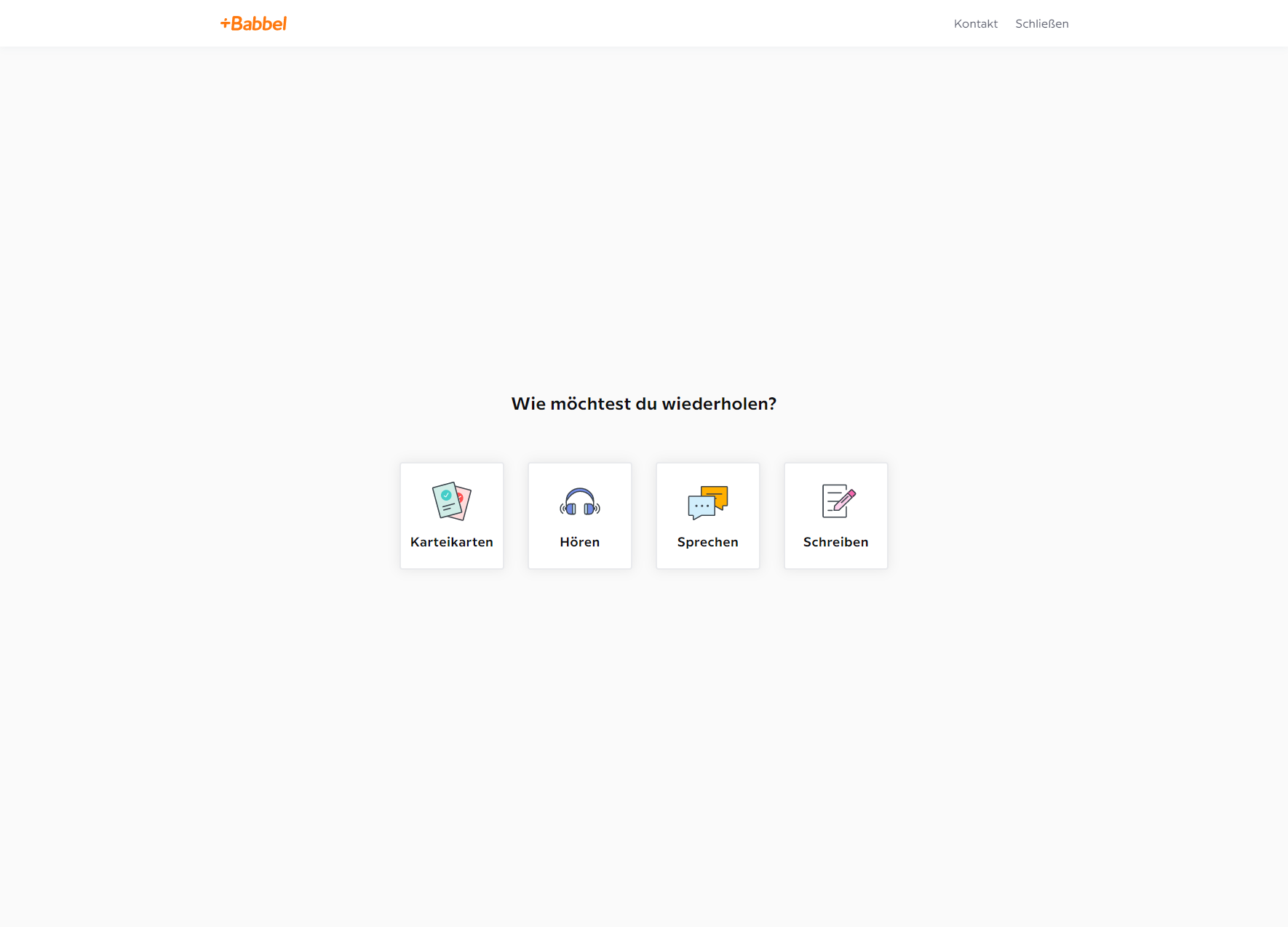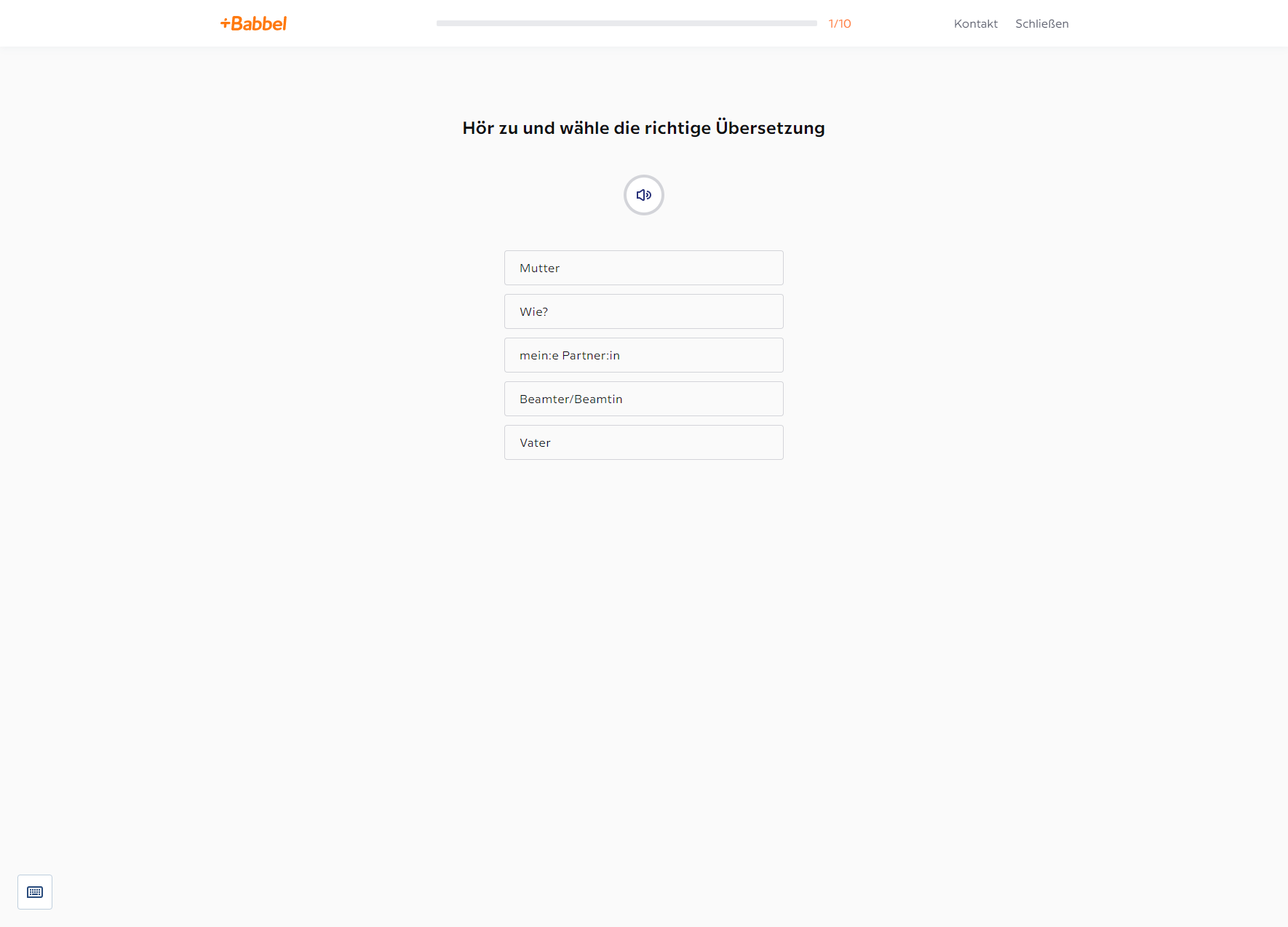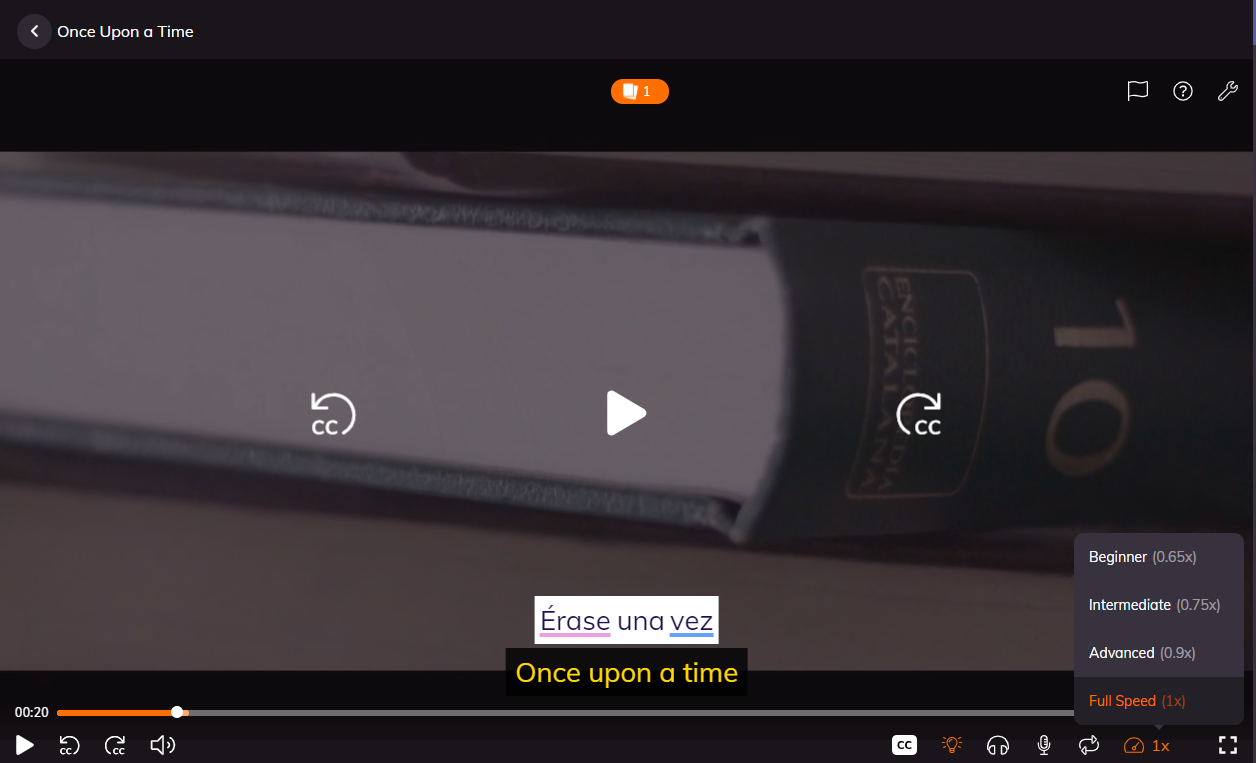Babbel review [2023] - Language Learning Apps
written by: Krystof
Table of Content
Get a discount on Babbel
I was allowed to test Babbel for free for 6 months from September 2022 until the end of February 2023. I chose a language that I don't know that much about, so that I could see so that I can see as well as possible whether Babbel has helped me to learn the language. And I have chosen....Turkish!
In this article, I'm going to go into full detail about various criteria for evaluating Babbel, from the login process, to the design and usability, to who Babbel is suitable for.
Registration / Login-Process
The login process is really simple. You go to the Babbel website and you click on the language,
you want to learn. In my example Turkish. After that you will be asked a few questions about why you want to learn the language,
what level you want to reach and how much time you want to spend on it. There are many more questions before you can register.
To be honest, I found it a few too many questions, or rather it annoyed me a bit that I had to click so much. At the end you enter your e-mail address and choose a password and you're ready to go!
After that, it is best to confirm your account via an email that you have received, so that your account is verified. You can then choose from 5 packages. I will go into the prices and packages later! Have you selected a package and your payment method, you can already start!
Design and usability of Babbel
The page is very clearly designed, you can quickly find the most important topics, such as, for example, the repetitions and the next lesson.
In general, the Babbel app is minimalistic and well structured. You can find your way around quickly and well. It is also very intuitive and easy to use in the individual exercises.
What is sometimes a bit annoying is that it sometimes loads a bit long when you have entered and confirmed the answer. Also, for example, in Turkish, the Turkish keyboard is not always displayed.

Scope and features
Repetition exercises
The repeats are visibly divided into four categories, and enriched with the corresponding icons. This makes it quick and easy to find the repeat category you like.

Listening excercise
The listening exercise starts immediately with the sound of the first vocabulary word. The sound could start a few seconds later so that you are not immediately overwhelmed. Again, the structure is very simple, so it is very easy to perform the listening exercise. I really like the fact that the words are spoken normally the first time you click on the speaker icon, and then more slowly the next time you click, so that you can concentrate on the pronunciation of the vocabulary. If the given answer is correct, a sound is played, which indicates that the answer was correct. Through this technique, the user is not only addressed visually, but also auditorily. This always creates a good feeling when you hear the sound and you are more motivated to click the correct answer. Overall, with this exercise you intuitively know what to do and it's fun to do the exercise as long as you don't have to do it for too long.

Speaking exercise
The speaking exercise is also designed in a very clean and modern way. The matching pictures to the vocabulary words make it easier to remember what the vocabulary word means that you have to pronounce. Further down is the word to be pronounced. You can listen to it by clicking on the button. If you click on the button with the microphone, you can record what you say and Babbel will check if it was correct. Sometimes it's a little difficult, if you don't pronounce the word correctly, to figure out what you're doing wrong. This could be made clearer, but I don't think the technology is there yet.
Contents and language levels
Babbel gives you content up to a certain language level depending on the language. Unfortunately Babbel does not say which language level you reach for each language. In Turkish, for example, only a level up to and including A2 is possible.
In languages like Spanish, for example, there are many more courses and content.
The content on Babbel is very diverse, from topics like family & friends, to travel and food, to business content.
Babbel prepares the content both textually and pictorially & auditorily. In some languages, such as Spanish, there is even a podcast,
to improve your listening comprehension. I wish such podcasts existed in the other languages Babbel offers.
Babbel also tries to motivate users with games. They are little mini-games in which you have to write down or click on the correct vocabulary words,
to learn vocabulary with more fun. For me personally, these games are a bit too boring in the long run, but a nice idea.
Didactic concept: How successfully I learn with Babbel
Babbel's Didactic Approach
Babbel sets itself apart with its didactic approach, which is rooted in practicality and real-life situations. Instead of overwhelming learners with abstract linguistic concepts, the app concentrates on teaching useful language skills applicable to everyday scenarios. By emphasizing practicality, Babbel ensures that users can apply their newly acquired knowledge in real-world conversations from the start.
Focus on Practical Language Skills and Real-Life Situations
One of the greatest strengths of Babbel is its commitment to teaching practical language skills. The app offers a wide range of lessons that cater to real-life situations, such as ordering food at a restaurant, asking for directions, or engaging in casual conversations. By immersing learners in these relevant contexts, Babbel encourages active engagement and builds confidence in using the language effectively.
Use of Interactive Exercises, Dialogues, and Multimedia Resources
Babbel's interactive exercises are a standout feature, as they make language learning engaging and enjoyable. The app provides various exercises that involve listening, speaking, reading, and writing, ensuring a well-rounded learning experience. These exercises often incorporate dialogues, allowing learners to practice their comprehension skills and familiarize themselves with authentic conversational patterns.
Moreover, Babbel leverages multimedia resources effectively to enhance the learning process. The app includes audio recordings by native speakers, enabling learners to improve their pronunciation and listening skills. Furthermore, visual aids, such as images and illustrations, are integrated into the lessons to reinforce vocabulary acquisition and facilitate understanding.
Incorporation of Grammar and Vocabulary Lessons
While focusing on practical skills, Babbel also recognizes the importance of grammar and vocabulary in language learning. The app strikes a balance by seamlessly incorporating grammar and vocabulary lessons into the curriculum. Learners are exposed to grammatical structures and rules within relevant contexts, making it easier to grasp and apply them in practical situations. Similarly, vocabulary is introduced gradually and reinforced through interactive exercises, ensuring learners build a solid foundation of words and phrases.
Personal expierence with Babbel
Brief Overview of Personal Language Learning Goals
When I started using Babbel to learn Turkish, my primary goal was to reach a level where I could hold basic, easy conversations within six months. I was motivated and eager to immerse myself in a new language and culture. However, over time, my motivation began to wane, and I found myself lacking a clear long-term goal to sustain my enthusiasm.
Description of the Learning Experience with Babbel
Babbel provided me with a user-friendly and structured learning experience. The app offered a variety of lessons and exercises that gradually introduced Turkish vocabulary, grammar, and conversational skills. The interactive exercises, dialogues, and multimedia resources helped to make the learning process engaging and enjoyable. The content was well-organized, allowing me to progress at my own pace and revisit previous lessons whenever necessary.
Effectiveness of Babbel's Didactic Concept in Achieving Language Learning Goals
Overall, Babbel's didactic concept proved to be effective in helping me make progress in learning Turkish. The emphasis on practical language skills and real-life situations enabled me to acquire useful vocabulary and essential conversational phrases. By focusing on relevant contexts, Babbel facilitated the application of language skills in everyday situations.
Assessment of Strengths and Weaknesses of Babbel's Didactic Approach
One of the strengths of Babbel's approach is its user-friendly interface and interactive exercises. The app made language learning accessible, especially for beginners like me. The incorporation of dialogues and multimedia resources, including audio recordings by native speakers, enhanced my listening and pronunciation skills.
However, a weakness I encountered was the lack of a clear long-term goal or guidance beyond the initial stages. After the initial excitement wore off, I struggled to stay motivated without a specific objective to strive for. While Babbel offers a wide range of lessons, it would have been beneficial to have a clearer roadmap or suggested milestones to maintain motivation throughout the learning journey.
Target group: For whom is the Babbel language course suitable
The Babbel language course is suitable for a wide range of language learners, catering to various proficiency levels and language learning goals. The app's flexibility and adaptability make it accessible to different individuals, including:
- Beginners: Babbel is an excellent choice for beginners who have little to no prior knowledge of the language they wish to learn. The app provides a solid foundation by introducing basic vocabulary, grammar, and essential language skills in a user-friendly manner.
- Intermediate Learners: Intermediate learners can benefit from Babbel's structured curriculum that builds upon foundational knowledge. The app offers more advanced lessons, dialogues, and exercises that help expand vocabulary, improve grammar skills, and enhance conversational abilities.
- Advanced Learners: Babbel's comprehensive course offerings also cater to advanced learners seeking to refine their language skills. The app provides in-depth lessons, advanced grammar explanations, and opportunities for authentic practice to further develop fluency and accuracy.
- Travelers and Tourists: Babbel is an ideal choice for travelers and tourists who want to learn practical language skills for their upcoming trips. The app focuses on real-life situations, providing learners with essential vocabulary, expressions, and cultural insights to navigate conversations and enhance their travel experiences.
- Professionals and Business Users: Babbel recognizes the importance of language skills in the professional world. The app offers specialized courses tailored to business communication, allowing professionals to improve their language proficiency in specific industry contexts.
- Self-directed Learners: Babbel's self-paced nature makes it suitable for learners who prefer to study independently. The app's interactive exercises, dialogues, and multimedia resources provide ample opportunities for self-guided learning and practice.
- Language Enthusiasts: Babbel appeals to individuals who have a genuine passion for learning languages. Whether motivated by personal interest or a desire to explore different cultures, language enthusiasts can enjoy the engaging lessons and resources offered by the app.
Price/Performance
When considering the price/performance ratio of the Babbel language course, it is essential to assess both the value provided by the app and the payment structure offered to users. While the prices of Babbel are generally fair and reasonable, one aspect that can be frustrating for some learners is the requirement to pay for the entire year upfront, rather than having the option to pay on a monthly basis.
In terms of value, Babbel offers a comprehensive language learning experience that includes interactive exercises, dialogues, multimedia resources, and structured lessons. The content is well-designed and caters to learners of various proficiency levels, making it a valuable resource for individuals seeking to acquire or improve their language skills. The app's emphasis on practical language skills, real-life situations, and grammar and vocabulary lessons ensures that users can effectively apply what they learn in real-world scenarios.
However, the payment structure of Babbel, where users are required to pay for a full year in advance, can be a drawback for some learners. This payment model may not be convenient or financially feasible for everyone, especially those who prefer the flexibility of monthly payments or who want to try the app before committing to a longer subscription period. It would be beneficial for Babbel to consider offering alternative payment options, such as monthly subscriptions, to accommodate a wider range of user preferences and circumstances.
Despite this inconvenience, it is important to note that the prices themselves are reasonable given the quality and depth of the content provided by Babbel. The app's subscription fees are competitive compared to other language learning platforms, and users can access a vast array of lessons and resources for the language(s) they choose to learn.
Detailed conclusion
The Babbel app stands as a powerful language learning tool, offering a wide range of features and resources to aid learners in their language acquisition journey. While there are several positive aspects to highlight, such as its comprehensive content, interactive exercises, and availability of podcasts and mini-games, it is important to acknowledge certain areas that could benefit from improvement.
One notable drawback is the payment structure, requiring users to commit to a full year subscription upfront. This approach may prove inconvenient for some learners who prefer more flexible payment options, such as monthly subscriptions. Offering alternative payment plans could make the app more accessible to a broader audience and cater to varying financial circumstances.
Another aspect to consider is the potential decline in motivation over time. Like many language learning endeavors, sustained motivation can be a challenge, and learners may experience a decrease in excitement after an extended period. While Babbel provides a structured learning experience and engaging exercises, introducing additional features, challenges, or milestones to sustain motivation throughout the learning journey could be beneficial.
Furthermore, it is worth noting that the content within Babbel may not be equally extensive for all the languages offered. While the platform covers a wide selection of languages, some languages may have a more limited range of lessons or advanced materials compared to others. Expanding the content to ensure a consistent level of depth and coverage across all languages would enhance the overall user experience.
On a positive note, Babbel offers podcasts in select languages, which can provide learners with an opportunity to practice listening skills and expose themselves to authentic language use. Additionally, the inclusion of mini-games adds a fun and interactive element to the learning process, promoting engagement and making language acquisition an enjoyable experience.
In conclusion, Babbel is a powerful language learning app that offers valuable resources and features. Its comprehensive content, interactive exercises, and supplementary materials like podcasts and mini-games contribute to a well-rounded learning experience. However, improvements can be made in terms of payment options, maintaining long-term motivation, and ensuring consistent content across all languages. By addressing these areas of opportunity, Babbel has the potential to further enhance its position as a leading language learning platform.
Hope that information helps!
Share this article!






